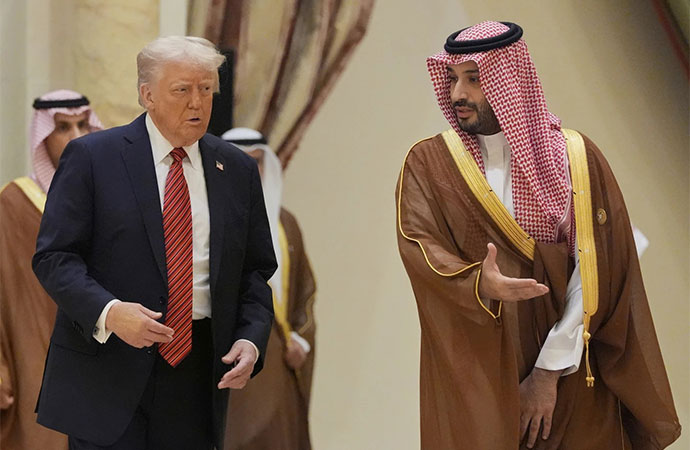Column

President Donald Trump arrives with Saudi Crown Prince Mohammed bin Salman for the group photo with Gulf Cooperation Council leaders during the GCC Summit in Riyadh, Saudi Arabia, Wednesday, May 14,2025. Photo: AP/UNB
American President Donald Trump's recent trip to the Middle East, during which he visited Saudi Arabia, Qatar and the United Arab Emirates, was a success. That is because he built on the status quo - existing good relations with those three trusted Arab partners - while reaching out to unlikely quarters. His surprise meeting in Riyadh with Syrian leader Ahmed al-Sharaa, a former jihadist, and his decision to lift sanctions on Syria revealed an intense degree of geopolitical realism at work. The new Syrian regime has an insurgent past, but that does not mean that the regime is bound to have an insurgent future as well. Having overthrown the Basher al-Assad regime, which was supported principally by Iran and Russia, the new Syrian rulers need to give the country a second chance so as to be able to rule it. The American lifting of sanctions is that second chance.
The US gesture is also a way to keep China from gaining a further foothold in the Middle East in Syrian form. Although Trump's Syrian gamble is just that - a gamble - it reveals the workings of the presidency. As Stephen Collinson of CNN writes, "A tour narrowly billed by the White House as a chance for Trump to show he's a master dealmaker is jumbling the region's geopolitical jigsaw puzzle. Wherever he goes, Trump brings disruption that can forge possibilities. And he takes risks - for instance, his decision on this trip to lift sanctions on Syria to give a war-ravaged nation a second chance. But the move revives a perennial question about Trump's entire foreign and trade policy. Can he apply himself sufficiently to reach genuine breakthroughs from openings he creates?" That remains to be seen.
In the meanwhile, Trump has made a diplomatic overture to Iran as well. He wants Iran to restrict its nuclear programme on the threat of military action if it refuses to do so. However, the threat is also an opportunity in the sense that Trump does not want a new Middle East war. This gesture should come as a gift to Teheran, which has been rebuffed by Assad's fall in Syria and even more so by Israel's relentless pummelling of Gaza and its attack on Lebanon, where the Iranian-sponsored Hezbollah militia has been forced into a tactical corner. Teheran's response will have major strategic ramifications in the months and years to come.
All this said, Trump has not forgotten Israel. No American president can afford to do so. On the one hand, Trump's journey, to quote Collinson again, has "highlighted growing daylight with Israeli Prime Minister Benjamin Netanyahu - who was seen as an ideological soulmate of the 47th president but who is increasingly an object of Trump's frustration". Israel's refusal to agree to a ceasefire in Gaza, which would have enhanced the peace agenda of Trump's Mideast visit, has ruffled Trumpean feathers. It is symbolically instructive that he avoided Israel as an itinerary on this trip. It was Trump's Arab trip. The American peace initiative regarding Yemen's Houthi rebels, who are sponsored by Iran, Israel's chief nemesis in the Middle East, also sidelined Israel, whose displeasure is clear.
On the other hand, however, the United States remains Israel's ultimate security guarantor. It cannot be otherwise. The Judaeo-Christian origins of the United States tie it to Jewish Israel as much as they bind it to Christian Europe, whether Protestant or Catholic. American foreign policy does not follow Biblical principles of right and wrong - how one wishes that it did - but the underpinnings of mainstream American thinking are contoured by the West's provenance in the Holy Land.
Israel knows this, and so it will not let its relationship with the United States skid off the historical rails. No degree of American overtures to Arabs can derail the almost biological relationship between Israel and America. Within that existential framework, visits come and go.
All in all, therefore, Trump's visit was a success. He drew three crucial Arab nations closer without affecting his fundamental relationship with Israel.
Saudi Arabia loomed large on his visit. It looms large in any case. Saudi Arabia is the natural leader of the Sunni world, as Iran is of the Shia world, but without Saudi Arabia alienating Israel existentially, as Iran has done by all but refusing to accept the Jewish state's right to exist. Saudi Arabia's oil wealth, its military power, and its economic and social modernisation under the exceptionally reformist Prince Mohammed bin Salman all point to Riyadh becoming the strategic capital of the Middle East, with Abu Dhabi and Doha complementing Riyadh's power in the region. A degree of reformulation of Teheran's foreign policy would draw the Shia world closer to the Sunni one and amplify the Middle East's centrality in the Muslim world. That Muslim world, in turn, would enjoy greater agency in global affairs, leading - one hopes against the odds - to a just resolution of the Palestinian issue in which two Abrahamic states, Palestine and Israel, would live in peace side by side. The West, another quintessentially Abrahamic entity, would not have any existential qualms with accepting a Middle East in peace with itself, much as the tenets of Judaism, Christianity and Islam proclaim and indeed demand.
President Trump mediated the Abraham Accords between Israel and the United Arab Emirates and Israel and Bahrain in 2020 on the normalisation of diplomatic ties. Sudan and Morocco went on to participate in that process. It is entirely appropriate to invoke Father Abraham, who is common to all the three faiths of Judaism, Christianity and Islam - in chronological order - in hoping that an independent Palestine will join that holy caucus one day.
America can do good. May it do so.
The writer is Principal Research Fellow of the Cosmos Foundation. He may be reached at epaaropaar@gmail.com

























Leave a Comment
Recent Posts
Pedaling Through the Mangroves ...
The journey from the bustling streets of Barishal to the serene, emera ...
Why the Interim Government mus ...
Two weeks out from what is expected to be a red letter day in the figh ...
Doesn’t matter who thinks what about Bangladesh deci ..
The Other Lenin
US President Donald Trump said his administration
Govt moves to merge BIDA, BEZA, BEPZA, MIDA